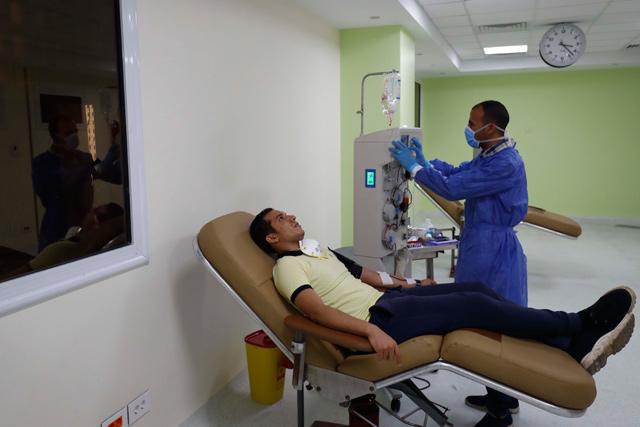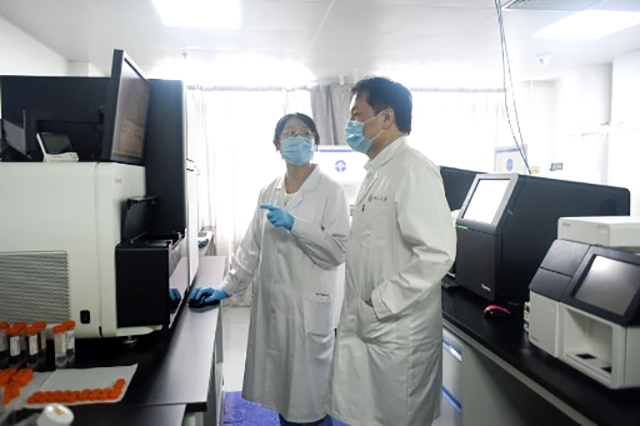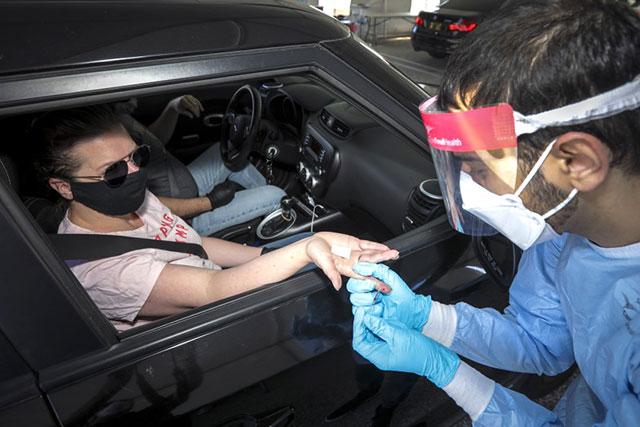You are here
Egypt tries plasma treatment to fight pandemic
By AFP - Sep 08,2020 - Last updated at Sep 09,2020

This Egyptian man who recovered from COVID-19 donates blood at the National Blood Transfusion centre in Cairo on July 22 (AFP photo)
CAIRO — Mohamed Fathi, an Egyptian man who has recovered from Covid-19, winced as he watched tubes running down his arm to donate blood plasma, but insisted: "if I can help just one person, that's a very good thing".
The 25-year-old land surveyor from Cairo caught the disease in May, on the eve of the Muslim Eid Al Fitr festival, becoming one of over 100,000 reported cases in Egypt, where more than 5,500 people have died of the novel coronavirus.
"Losing the sense of taste was a terrible experience," he told AFP at Egypt's National Blood Transfusion headquarters in Cairo, describing just one of his symptoms. "You feel like you're eating for the sake of it."
Things got worse for the family when his elderly father was also infected, making Egypt's blistering hot summer months a hellish period of fretting over his recovery from a loud, dry cough and constant fevers.
"I came to donate today because I didn't want someone else to go through what I and my family went through," said the softly spoken young man, one of about 200 volunteers who have so far taken part in the budding project.
Egypt, like the United States and a handful of other countries, is trying to fight the pandemic in part by using convalescent plasma, the watery fluid in the blood of recovered patients that is teeming with antibodies.
After US President Donald Trump touted it as a temporary cure, his administration issued an emergency authorisation last month to use plasma from recovered Covid-19 patients.
The idea is to harvest the plasma and inject it into other patients to give them an immunological boost that helps fight the same infection.
The scientific community is divided on using plasma to treat Covid-19, but proponents say the technique has proven effective in small studies to treat other infectious diseases, including Ebola and SARS.
'Glimmer of hope'
Nascent clinical plasma trials to fight the Covid-19 pandemic have also been launched in Bolivia, Britain, Colombia, India, Mexico, Pakistan and South Korea.
Ihab Serageldin, director of Egypt's National Blood Transfusion Centre, said he believes convalescent plasma is a promising treatment while the race continues to develop, mass-produce and distribute an effective vaccine.
Since April he has spearheaded Egypt's campaign urging the country's more than 79,000 known recovered patients to donate their plasma.
"Coronavirus is one of these viruses that doesn't have a manual ... we're combating an unknown enemy, so any form of treatment that offers a glimmer of hope we need to hold onto," he told AFP.
"If the US didn't find it promising then it wouldn't have launched a national campaign urging recovered virus patients to donate their plasma," he said.
Serageldin said in Egypt eligible donors must be aged 18 to 60, weigh at least 50 kilogrammes and have produced a certain quality of antibodies.
Over 200 people have so far donated plasma, each providing 800 ml of the fluid split into four bags, enough to treat two patients.
Serageldin said there was no data yet on the success rate of Egypt's plasma project.
Many more donations are needed, he said, stressing that "blood donations in general are low in Egypt, so we're working on raising awareness among the general public".
The meagre numbers of donors prompted advertising executive Ahmed Mostafa, 37, to create an app called Mosanda ("Support") to connect recovered patients with those infected.
Mostafa has a strong motivation -- he had also caught the disease in late May.
"After a month of exhaustion from the virus, I wanted to contribute to making other patients' lives better," he said.
He teamed up with a web developer and medical doctors to design the easy-to-use Android app, which was released in June.
"We want to be the link between patients, but the response has been very slow," he said.
With the minimal uptake online, he is planning to expand his app to make it a general blood donation service, meeting another pressing need in Egypt's strained healthcare sector.
Mostafa also sees the app, and a regulated, centralised plasma project, as a safe alternative to an emerging black market.
In June, local media reported that plasma bags from recovered patients were being informally traded for over 20,000 Egyptian pounds ($1,200) each.
Related Articles
For 10 patients severely ill with the new coronavirus, a single dose of antibodies drawn from the blood of people who had recovered from COV
BEIJING — A Chinese laboratory has been developing a drug it believes has the power to bring the coronavirus pandemic to a halt.The outbreak
LOS ANGELES — At a flotation therapy studio in Marina Del Rey, California, the sensory deprivation tank is empty, but antibody tests for the

















